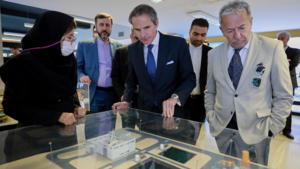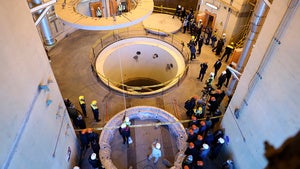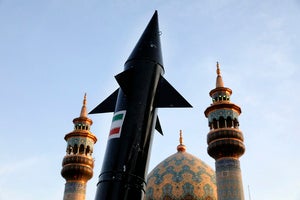Majorities of Democrats and Independents support a potential deal similar to the 2015 Joint Comprehensive Plan of Action, but only a minority of Republicans agree.
For the first time since the United States withdrew from the 2015 Joint Comprehensive Plan of Action (JCPOA), American and Iranian officials held direct talks to negotiate a new nuclear deal. These talks come amid reports of Iran’s rapid production of enriched uranium and acceleration of its nuclear weapons program.
A recent Chicago Council on Global Affairs-Ipsos survey, fielded April 18–20, 2025, finds a majority of Americans consider a nuclearized Iran unacceptable and believe the United States should negotiate a deal with Tehran to limit its development. While Democrats and Independents support a deal that would trade sanctions relief for limitations on Iranian nuclear enrichment, Republicans oppose such a tradeoff. However, they may end up following US President Donald Trump’s lead if current negotiations bear fruit.
Key Findings
- Eight in 10 Americans oppose Iran obtaining nuclear weapons (79%) and favor taking diplomatic steps (83%) or tightening economic sanctions (80%) to limit further nuclear enrichment.
- A smaller majority of Americans believe the United States should participate in an agreement that lifts some international economic sanctions against Iran in exchange for strict limits on its nuclear program (61%).
- Partisan differences on a nuclear agreement are striking: 78 percent of Democrats and 62 percent of Independents support US participation in a deal with Iran compared to just 40 percent of Republicans.
- If diplomacy or economic sanctions fail, many Americans are willing to take more forceful approaches: Six in 10 support the United States conducting cyberattacks against Iranian computer systems (59%), and half support conducting airstrikes against Iran’s nuclear facilities (48%).
- A majority oppose sending US troops to destroy Iran’s nuclear facilities (60%).
Americans Favor Diplomatic Approach to Iranian Nuclear Development
The 2015 JCPOA, or the Iran Deal, was a landmark agreement reached between Iran and the P5+1 (China, France, Russia, the United Kingdom, the United States, and Germany) that limited Iranian nuclear enrichment in exchange for sanctions relief and other provisions. While it was initially successful in limiting Iran’s stockpile of enriched uranium, the United States withdrew from the deal in 2018, as the first Trump administration considered it insufficient in curbing Iran’s ballistic missile program and protecting American regional interests. Upon the US withdrawal from the agreement, Iran promptly lifted the cap on its stockpile of uranium and increased its enrichment activities; it has since reached weapons-grade levels of enriched uranium.
With Tehran now closer than ever to developing nuclear weapons—a prospect that is unacceptable to most (79% oppose, 16% support)—Americans broadly support taking diplomatic steps (83%) and increasing economic sanctions (80%) to limit further nuclear enrichment. In a separate question, a smaller majority of Americans reinforce their support for a diplomatic resolution: Six in 10 say the United States should participate in an agreement that lifts some international economic sanctions against Iran in exchange for strict limits on its nuclear program (61%).
While at least eight in 10 Americans across all partisan groups favor diplomacy, there are sharp partisan differences on an international agreement along these lines. Solid majorities of Democrats (78%) and Independents (62%) support an agreement that trades sanctions relief for limits on Iran’s nuclear program, while just four in 10 Republicans agree (40%, 57% oppose).
Republicans and Democrats have long held diverging views over US participation in such a nuclear deal. For the last decade, more than seven in 10 Democrats and a narrower majority of Independents have consistently supported a nuclear agreement with Iran. Republicans have been at best divided, like in 2021, and at times fully opposed to US participation in such an agreement, like in 2025 (see appendix table 1).
Americans Open to Using Cyberattacks but More Hesitant on Using Force
If diplomatic or economic tools were ineffective in thwarting Iran’s nuclear ambitions, a majority of Americans would support conducting cyberattacks against the country’s computer systems (59%). However, they are more hesitant to take direct military action: The public is evenly divided (48% support, 47% oppose) on conducting airstrikes against Iranian nuclear facilities and opposed to sending US troops to destroy Iranian nuclear facilities (60% oppose, 35% support). These findings are broadly aligned with past surveys, though support for each of these measures was higher in 2021. Support for sending US troops, however, is at its lowest point since the Chicago Council started asking this question in 2019 (see appendix table 2).
Republicans More Supportive of Direct Military Action
In general, Republicans favor a more hardline approach to Iran than other partisans. Of the broad range of policy options to address Iranian nuclear development, imposing tighter economic sanctions on Iran is their most favored (88%), followed by a diplomatic response (80%).
Majorities of Republicans also endorse the use of US cyberattacks (70%) and US airstrikes against Iran’s nuclear facilities (69%) and to a much greater degree than their partisan counterparts. Just over half even support putting boots on the ground to destroy Iranian nuclear facilities (52%). In fact, Republicans are the only partisan group to reach majority levels of support for airstrikes or sending US troops.
Iran Seen as Playing Most-Negative Role in Middle East
The initial 2015 Iran agreement was criticized for not being tough enough on Iran for its sponsorship of destabilizing militant organizations in the region, like Hamas and Hezbollah. These activities have come to the forefront of regional upheaval over the last year, as Israel clashed with Hamas in Gaza and Hezbollah in Lebanon.
Nearly nine in 10 Americans view Iran as playing a negative role in resolving the challenges facing the Middle East (87%). However, they do not consider any other country playing a positive role in the region—with the exception of the United States (in which case they are divided with 50% positive role, 45% negative role). The share of Americans believing the United States is playing a positive role in the Middle East has dropped since 2024 (61%, see appendix table ).
In a similar vein, on a scale of 0–100, with 0 being the coldest, most unfavorable rating and 100 being the warmest, most favorable rating, Americans give Iran a chilly average score of 25. Republicans view Iran the least favorably, giving the country an icier average score of 17, while Democrats and Independents rate it slightly higher (30 and 26, respectively).
Conclusion
Although US President Donald Trump has not ruled out using military action to stop Iran from obtaining a nuclear weapon, he said he favors a diplomatic agreement to address this issue. Recently, Trump administration officials have given contradictory remarks about current talks, and they have yet to specify how renewed negotiations will produce an agreement more stringent and impactful than its predecessor.
The pressure is on American diplomats to secure a deal that would limit Tehran’s nuclear enrichment without providing the sanctions relief that could potentially fund Iran’s efforts to further destabilize the Middle East or threaten the United States’ regional allies, including Israel. While the outcome of these negotiations remains to be seen, the public continues to express a preference for using diplomatic or economic coercion than direct military action.
Appendix Table 1. Opposition to Nuclear Agreement with Iran
Based on what you know, do you think the US should or should not participate in the following international agreements? The agreement that lifts some international economic sanctions against Iran in exchange for strict limits on its nuclear program for at least the next decade (% should not participate)
| Year | Overall | Republican | Democrat | Independent | R-D Gap |
|---|---|---|---|---|---|
| 2016 | 36 | 40 | 22 | 36 | 18 |
| 2017 | 36 | 34 | 25 | 39 | 9 |
| 2018 | 30 | 35 | 21 | 43 | 14 |
| Jan 2021 Omni | 39 | 40 | 19 | 41 | 21 |
| 2021 | 36 | 41 | 22 | 37 | 19 |
| 2023 | 36 | 34 | 21 | 43 | 12 |
| April 2025 | 34 | 57 | 19 | 32 | 38 |
Appendix Table 2. Support for Sending Us Troops to Destroy Iran’s Nuclear Facilities
If Iran restarts development toward a nuclear weapon, would you strongly support, somewhat support, somewhat oppose or strongly oppose the US taking each of the following actions: (% somewhat + strongly support)
| Year | Overall | Republican | Democrat | Independent | R-D Gap |
|---|---|---|---|---|---|
| 2019 | 40 | 55 | 38 | 31 | 17 |
| 2021 | 49 | 67 | 39 | 45 | 28 |
| April 2025 | 35 | 52 | 27 | 29 | 25 |
Appendix Table 3. Role United States Plays in the Middle East
In your opinion, are the following countries playing a very positive, somewhat positive, somewhat negative or very negative role in resolving the key problems facing the Middle East? (% very + somewhat positive)
| Year | Overall | Republican | Democrat | Independent | R-D Gap |
|---|---|---|---|---|---|
| 2015 | 69 | 69 | 74 | 65 | -5 |
| 2024 | 61 | 68 | 66 | 52 | 2 |
| April 2025 | 50 | 81 | 34 | 43 | 47 |
The study was conducted April 18–20, 2025, by Ipsos using its large-scale, nationwide, online research panel, KnowledgePanel, among a weighted national sample of 1,019 adults 18 or older living in all 50 US states and the District of Columbia. The margin of sampling error for the full sample is ±3.2 percentage points, including a design effect of 1.10.
The data for the total sample were weighted to adjust for gender by age, race/ethnicity, education, Census region, metropolitan status, and household income using demographic benchmarks from the 2024 March Supplement of the Current Population Survey (CPS).
Specific categories used were:
- Gender (Male, Female) by Age (18–29, 30–44, 45-59 and 60+)
- Race/Hispanic Ethnicity (White Non-Hispanic, Black Non-Hispanic, Other, Non-Hispanic, Hispanic, 2+ Races, Non-Hispanic)
- Education (Less than High School, High School, Some College, Bachelor or Higher)
- Census Region (Northeast, Midwest, South, West)
- Metropolitan Status (Metro, non-Metro)
- Household Income (Under $25,000, $25,000–$49,999, $50,000–$74,999, $75,000–$99,999, $100,000–$149,999, $150,000+)




Related Content
 Defense and Security
Defense and Security
Given Tehran’s weakened state and Washington’s eagerness for a deal, success is possible. However, it’s more likely to resemble the 2015 one Trump abandoned.
 Defense and Security
Defense and Security
Several states that had long been under the US nuclear umbrella are considering developing their own nuclear weapons. Paul Poast digs into the implications.
 Public Opinion
Public Opinion
Whether attacked by its neighbors or Tehran, majorities of Americans oppose using US troops to come to Israel’s defense.
 US Foreign Policy
US Foreign Policy
The US public is now equally split on whether Israel’s war against Hamas in Gaza is justified or not.
